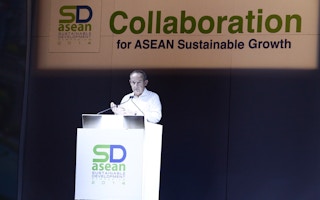BANGKOK, THAILAND - As Asean prepares itself for regional integration next year, policies for sustainable development are in place but the challenge is getting it “off the drawing board into implementation” at a time when economic growth is high on the agenda, said Yvo de Boer, Director-General of the Global Green Growth Institute.
To continue reading, subscribe to Eco‑Business.
There's something for everyone. We offer a range of subscription plans.
- Access our stories and receive our Insights Weekly newsletter with the free EB Member plan.
- Unlock unlimited access to our content and archive with EB Circle.
- Publish your content with EB Premium.
Outlining pressing global issues such as climate change, energy, food and water security and deforestation, the head of the Seoul-headquartered institute noted that this has been driven by Asia’s urbanization, population growth and wealth increase.
“I sometimes have the feeling Asia think it’s immune and can worry about it later when economic growth and prosperity is achieved – that is a dangerous illusion,” he said while addressing the fourth Asean Sustainable Development Symposium in Bangkok on Friday.
The Association of Southeast Asian Nations, also known as Asean, is set to establish the Asean Economic Community - a common market meant to increase the flow of goods, labour and capital within the bloc – by the end of next year.
Asean secretary-general Le Luong Minh, also speaking at the event attended by 500 industry professionals at Plaza Athenee, said as the region forges ahead with integration efforts, “we also have to ensure the judicious use of our rich natural resources which sustain vital life support systems, fostering economic growth without degrading the natural environment”.
He called for the private and public sectors in member countries to work together to achieve a “clean and green” Asean community.
This path will not be easy, he cautioned, as the globalizing world is driven by intense economic progress and unsustainable consumption of natural resources. While economic growth and social development will remain a priority and Asean must continue to “rigorously pursue” sustainable development.
“As a people-centred Asean community, we also need to meet the needs of nearly 625 million ASEAN people who are rapidly moving up the human development ladder, while enhancing their resilience and social protection systems against natural and man-made disasters.”
Echoing this sentiment, GGGI’s de Boer also called for closer collaboration between the public and private sector to implement sustainable development policies in the region.
Public-private partnerships are only beginning to be understood, but there are encouraging instances of the private sector responding to sustainability issues and governments setting the direction on where policy needs to go, said the former head of the United Nations Framework Convention on Climate Change (UNFCCC).
He added that the real challenge is for the private sector to design sustainability programmes in the “language of bankers” which meet the risk-and-reward criteria, and for policymakers to de-risk policies from investments related to sustainability.
“Asean is at a crucial moment in time – there is the choice to get ahead of the curve or be left behind,” he said.
“
I sometimes have the feeling Asia think it’s immune and can worry about it later when economic growth and prosperity is achieved – that is a dangerous illusion.
Yvo de Boer, Global Green Growth Institute director-general
The symposium was hosted by Thai conglomerate Siam Cement Group as part of its centennial celebrations. The firm, which has operations throughout Asean and businesses in cement, chemicals and paper, has been selected by the Dow Jones Sustainability Index as a sustainable leader in the construction materials industry every year since 2011.
SCG president and chief executive, Kan Trakulhoon, told delegates that in the past, sustainable development was “a choice” to boost the reputation of organisations.
But today, sustainability has become a pre-requisite for businesses, and the private sector is the “real player that could effect change due to its flexibility and influence throughout the supply chain”, he said.










